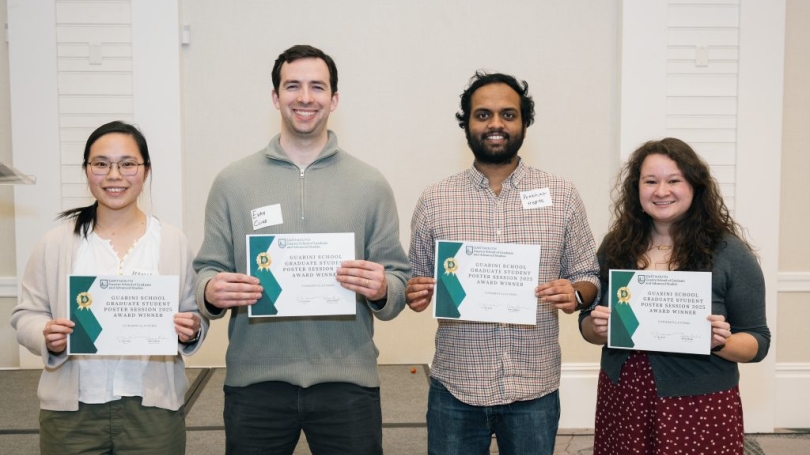
Poster session award winners (left to right): Bernice Leung (Microbiology and Immunology), Evan Cline (Chemistry), Prabhat Hegde(Engineering Sciences), and Quin Shingai (Ecology, Evolution, Environment, and Society).
The Guarini School of Graduate and Advanced Studies welcomed more than 350 students, faculty, staff, and guests to the Ballroom at the Hanover Inn on April 9 for its signature spring event: the annual Guarini Graduate Student Poster Session. The evening highlighted the creativity, rigor, and impact of graduate research at Dartmouth.
A total of 31 graduate students across 15 disciplines presented research posters on topics ranging from molecular steganography and bat bioacoustics to stormwater infrastructure design and cancer immunotherapy. Each presentation offered a unique window into the intellectual vibrancy and impact of Dartmouth's graduate research community.
President Sian Leah Beilock and Dean of the Guarini School Jon Kull were in attendance, engaging with student presenters, listening to their presentations, and emphasizing the critical role graduate students play in advancing Dartmouth's academic mission.
"The Poster Session is always a reminder of how deeply our graduate students are embedded in every facet of Dartmouth's research enterprise," said Dean Kull. "Their work is intellectually daring, socially relevant, and methodologically rigorous."
Four students were recognized with top prizes by faculty and staff judges for the clarity, accessibility, and engagement of their presentations:
Each winner received a $200 prize. The judging panel, composed of faculty and administrative leaders from across campus, evaluated posters based on visual clarity and the presenters' ability to communicate their work in terms understandable to a non-specialist audience—all within a three-minute window.
Whether analyzing ancient village patterns in the Upper Connecticut River Valley or decoding the intricacies of immune system response, this year's poster session affirmed that Dartmouth's graduate students are not only advancing knowledge, but they are helping shape a better future.